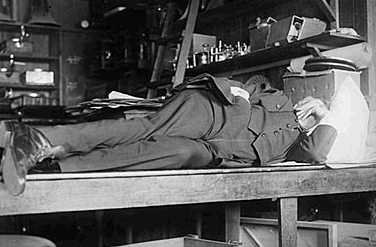Most people believe that when you sleep, your brain sleeps too. That’s a common myth. In reality, your brain never truly rests—it just changes its job. During sleep, especially certain types of sleep, your brain is incredibly active. It processes what you’ve learned, consolidates memories, organizes emotional experiences, and recharges your creative problem-solving battery. In short, if you’re depriving yourself of sleep to get more work done, you’re likely sabotaging your own productivity.
This is especially true for workaholics who believe they’re gaining an edge by skipping rest. The reality? They’re dulling their mental edge. Lack of sleep affects everything from attention and mood to logic and even motor skills. Your brain might power through short bursts, but the cost adds up fast.
Related Post: How to Structure Your Day for Peak Creativity, Energy, and Focus
Your Brain Craves Breaks—Especially in the Afternoon
We’re biologically wired to need more than one bout of sleep per 24 hours. Historically, early humans likely didn’t sleep in one uninterrupted eight-hour block. It was simply too dangerous. Instead, they napped in shifts. And while we’ve evolved in many ways, our sleep biology hasn’t changed that much. That afternoon slump you feel around 2 or 3 p.m.? That’s not laziness—it’s biology.
In his book When: The Scientific Secrets of Perfect Timing, author Daniel Pink explains that most people experience a significant dip in energy and alertness during the early afternoon. This period, often dismissed as the “post-lunch crash,” is actually a natural drop in core body temperature and mental alertness—your brain is signaling that it wants a break.
Pink suggests an easy, science-backed hack to overcome this dip: the “nappuccino.” Here’s how it works:
- Drink a cup of coffee. Yes, it’s counterintuitive, but bear with us. Caffeine takes about 20–30 minutes to kick in.
- Set a timer for 25 minutes. Lie down in a quiet, dark space.
- Nap for no more than 25 minutes. Anything longer and you risk slipping into deeper sleep stages. That can trigger sleep inertia, leaving you groggy rather than refreshed.
- Wake up just as the caffeine is kicking in. You’ll feel alert, recharged, and ready to tackle the rest of your day.
The NASA Nap: Scientific Proof That Sleep Improves Performance
Still skeptical? Consider this: NASA conducted a study on pilot performance and discovered that a short nap can significantly improve performance. After just a 26-minute nap, pilots were 34% more effective and 54% more alert than their non-napping peers. That’s not just a little bump in energy—that’s a dramatic boost in performance, especially when operating at high stakes.
This kind of power nap doesn’t just benefit pilots. It can help anyone working in cognitively demanding environments—entrepreneurs, students, employees in high-pressure roles, or anyone who needs to make good decisions fast.
History’s Great Nappers
Some of history’s most productive minds swore by naps. Winston Churchill famously structured his day around two work sessions—one in the morning, one in the evening—separated by a solid nap. John F. Kennedy and Thomas Edison also built napping into their daily routines. They weren’t lazy—they were strategic. They knew their most creative and productive hours came after they let their minds rest.
Sleep Isn’t Lazy—It’s Smart Strategy
Our need for sleep is influenced by many factors: age, gender, lifestyle, health status, and even pregnancy. But regardless of these variables, one truth remains—sleep is a necessity, not a luxury. People often push through the day fueled by caffeine, sugar, and sheer willpower. But science says they’re fighting a losing battle.
Instead of pushing against our biology, what if we leaned into it? By understanding and honoring our natural rhythms, we can work with our bodies and brains to get more done—better, faster, and with fewer mistakes.
Make the Nap Your Competitive Advantage
Imagine replacing your 2 p.m. slump with a 2:30 p.m. surge. That’s what a well-timed power nap can do. Whether you call it a nappuccino, a strategic reboot, or simply a midday reset, it’s a performance-enhancing secret used by top performers throughout history—and backed by science today.
So, the next time you feel that wave of fatigue rolling in, don’t reach for another energy drink. Try Pink’s nappuccino method. Your brain—and your productivity—will thank you.
What about you? Could incorporating a short afternoon nap be the performance boost you’ve been overlooking?












